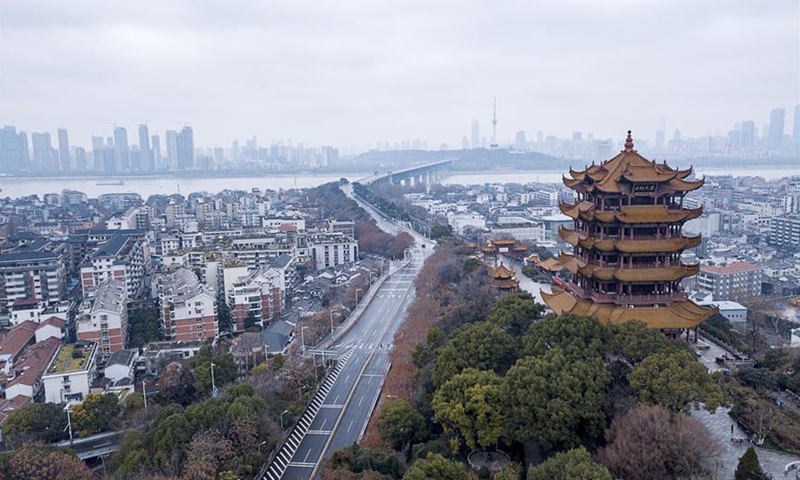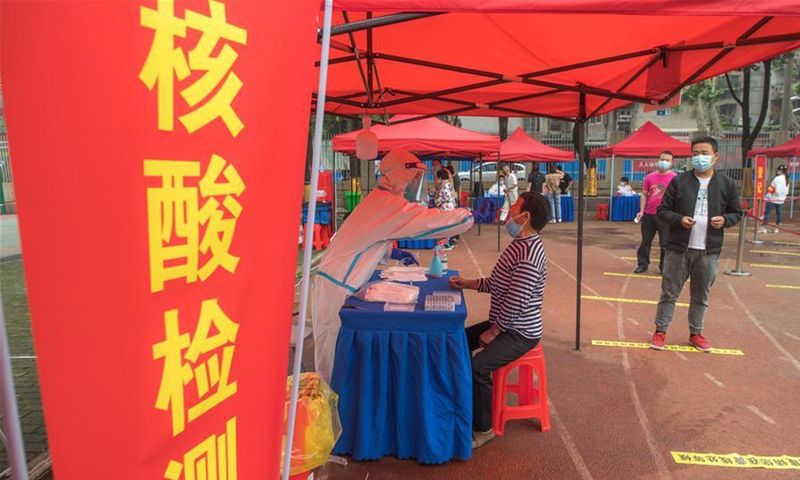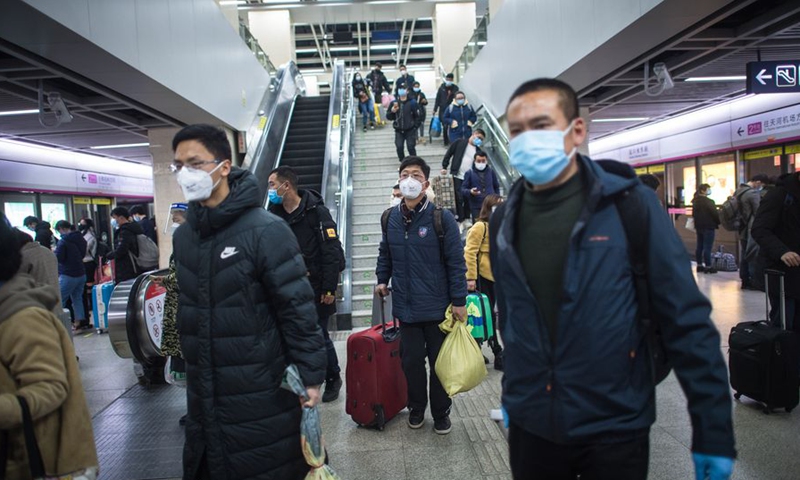Xi's instructions on Wuhan lockdown lay cornerstone of China's victory against COVID-19
Source:Global Times Published: 2020/6/7 10:30:15 Last Updated: 2020/6/7 23:32:21

Aerial photo taken on Jan. 26, 2020 shows the Yellow Crane Pavilion and the Yangtze River Bridge in Wuhan, central China's Hubei Province. Many residents here have reduced or avoided outdoor activities during the Spring Festival holiday in Wuhan, the hardest-hit city of the novel coronavirus outbreak in central China. (Xinhua/Xiong Qi)
All COVID-19 patients who were discharged from hospital in Wuhan, once the hardest-hit city, have now completed city-wide nucleic acid tests which only found a few asymptomatic patients, signaling that life is returning to normal after nearly five months of the arduous battle against the virus. The good news from Wuhan serves as ironclad evidence that the far-sighted decision to seal off Wuhan and Hubei Province laid the cornerstone of China's victory in the nationwide COVID-19 battle.
The instruction to impose the traffic control and people's movement in Wuhan and Hubei was made by President Xi Jinping, also general secretary of the Communist Party of China Central Committee and chairman of the Central Military Commission on January 22, according to the White Paper on fighting COVID-19: China in Action, issued by State Council Information Office on Sunday.
On January 22, Xi ordered the immediate imposition of tight restrictions on the movement of people and channels of exit in Hubei and Wuhan, the white paper said.
The decision was made two days before evidence was announced revealing that the virus transmits via humans.
On January 23, the following day, the Wuhan local government announced to shut down the city's outbound channels at airports and railway stations starting 10 am.
The decision to seal off Wuhan was widely endorsed among experts; it is a decisive decision, said Wang Guangfa, a leading Chinese respiratory expert at Peking University First Hospital in Beijing, who was also among the first group of experts dispatched by the National Health Commission (NHC) to Wuhan in early January. "You can see the figures of infection cases, after reaching a boiling point, nosedived from that point and then slowed to a trickle. The figures speak for themselves - the effect is so obvious," said Wang.
On Thursday, Hubei accomplished seven "zeros": zero new COVID-19 cases, zero new suspected cases, zero new deaths, zero silent carriers, zero imported cases, zero existing confirmed cases and zero existing suspected cases, the provincial health official said.

Residents take nucleic acid tests at a testing post set up at a primary school in Dongxihu District in Wuhan, central China's Hubei Province, May 15, 2020. (Xinhua/Xiao Yijiu)
Wuhan's recent thorough city-wide COVID-19 tests covering 9,899,828 residents, the results of which were released on Tuesday. Only 300 asymptomatic patients were found, with no confirmed COVID-19 cases.
Wang said the US' status quo has also proved how wise and timely the decision to lock down Wuhan was.
US President Donald Trump said on May 29 that "China's cover-up of the Wuhan virus allowed the disease to spread all over the world, instigating a global pandemic that has claimed over 100,000 American lives and infected over a million worldwide."
"I don't know if it was incompetence or if it was done for some other reason. They stopped it coming from China, but they didn't stop it from going to the rest of the world," he added.
Facts are the best answer. The Chinese side locked down Wuhan on January 23, and there were no commercial flights or trains leaving Wuhan from January 24 to April 8, and the US government banned the entry of Chinese citizens and foreigners who had visited China in the past 14 days, said Zhao Lijian, spokesperson of China's Ministry of Foreign Affairs on June 1, noting that "I wonder what he meant by saying China let infected people 'travel freely'?"
"China suspended all traffic leaving Wuhan once the lockdown order was given, if my memory serves me right, it was the US itself wanting to repatriate its nationals back," said Wang, adding if China covered up the outbreak, how the US could know the situation and repatriate its nationals back.
He noted that another misstep the US made to prevent the contagion was that it had only its eyes on China, but ignored travellers from Europe.
Head of the China CDC talked over phone with director of the US CDC about the outbreak on January 4. The US was among the first nations to suspend flights to and from China in late January.
"They believed they would be fine by cutting all possible connections with China and rest easy, but the US had missed the golden window of opportunity, which had cost China a lot to fight for, and procrastinated in their response to the virus," Li Haidong, a professor from the Institute of International Relations at China Foreign Affairs University, told the Global Times.

Passengers walk on the platform of the subway station connected with Hankou Railway Station in Wuhan, central China's Hubei Province, March 28, 2020. (Xinhua/Xiao Yijiu)
Scientific journal Science's publication said that China's control measures during the first 50 days of the COVID-19 epidemic may have delayed the spread of the virus to cities outside of Wuhan by several days and prevented more than 700,000 infections nationwide.
Meanwhile, the US has the world's highest rate of infections and deaths so far, 22 times higher than China's numbers. A New York Times report said the delayed response from the US government cost 36,000 lives, and if the government had taken measures two weeks earlier, 83 percent of US coronavirus deaths could have been avoided.
The test results also show that regarding the viral battle, China and the US gave its people utterly different answer sheets of their fight. With ultimate respect for people's lives, Wuhan and other place of China are healing at the fastest pace; while the Trump administration's effort of restarting the economy has only accelerated its viral spread and skyrocketed the country's deaths, said Li.
Posted in: SOCIETY,FOCUS